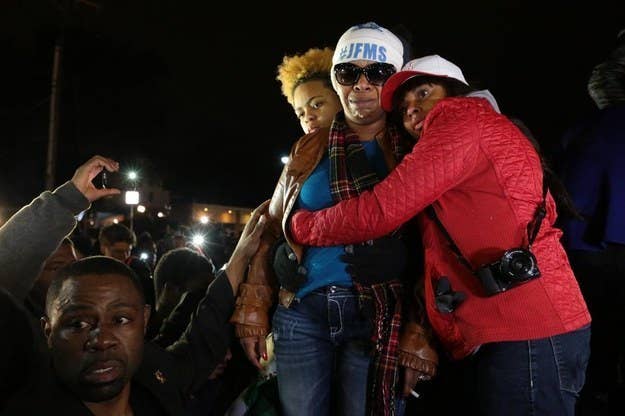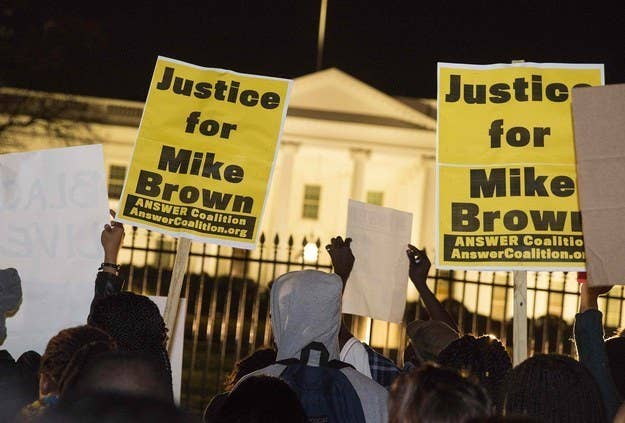
Last night, in my home, all three adult generations of women seized on a different detail of the Michael Brown grand jury decision. My grandmother, in her seventies and semi-retired from stenography, had fallen asleep early after a long day working at the courthouse in downtown Baltimore. She woke after 11 p.m. to find me parked in front of the living room TV, watching cars and businesses burn.
I told her what St. Louis County Prosecuting Attorney Bob McCulloch had said. "No charges."
"Nothing?"
"Nope."
She plopped down on the loveseat adjacent to my spot on the sofa.
"Their grand jury is different," she insisted. "Their grand jury must be different."
She meant that she believed that, here in Baltimore, the decision in a case like this might've been different. She has worked in the judicial system for decades, in a predominantly black city, where black judges and lawyers gave her daily hope that the lily-white juries and "justice" of her youth were a thing of the past. She believes in fair governance — not always, but often.
I have never been so sure. But I've also learned not to challenge her confidence. She has lived through 40 more years of injustice than I have. She needs to believe that the courts to which she's committed so much of her life's service have become more capable of fairness in 2014.
When my eyes began to burn from staring at the TV too long, I sought out my mother. She was sitting on her bed, also watching a television. It was airing a photograph of Michael Brown's mother, Lesley McSpadden. In the picture, taken as she stood among protesters last night, her face was frozen in anguish. Reportedly, she screamed and sobbed when she heard the decision. "What do you mean, no indictment?" she asked before running from a room, trailed by heartbroken loved ones. Before morning, a video of her addressing those protesters would surface. She would say, "Everybody wants me to be calm. Do they know how those bullets hit my son, what they did to his body as they entered his body?"
My mother said, "I wish she had stayed home for this."
What she meant is that pain this raw calls out to pain this raw. What she meant is that she's worried public grief over justice deferred will incite more public rage. I know — because we've been discussing this case all autumn — that she wishes that, at some point after losing its eldest son, this family had been afforded the small and joyless respite of privacy.
But what I heard is that we have come to expect mothers like Lesley McSpadden to follow a particular script: eyes damp, jaw tight, lips pursed in silent resignation, shoulders squared with steely resolve, all sobbing and rage walled within private homes. My mother's earliest memories of this script were in the '60s. She saw Coretta Scott King and Myrlie Evers and Betty Shabazz with their chins lifted, delicately dabbing their eyes with kerchiefs, hands still atop skirts of jet-black. "(With dignity)" may as well have been written in the stage notes, (stoically) jotted in the margins.
I didn't push back against what my mother has said. But if there were any night that we shouldn't be worried about how a wronged and grieving community responds to horrible news, it was last night. Why shouldn't Lesley McSpadden wail in the streets? Why couldn't she rend her heart and garments in the same public square where her son was killed? And why shouldn't the entire city follow her lead?
At the end of the brief video of Lesley McSpadden among protesters, she sobbed, "They still don't care. They're never gonna care. I've been here my whole life." And I think: I am most like her, inheritor of centuries of outcomes just like this one. I do not know how to hold all those histories of murders unpunished. I do not intend to mourn every new one serenely.

For my part, I trained my eyes on the president. Obama appeared on-screen less than a half hour after Bob McCullough, looking weary and unable to speak freely. He quoted Michael Brown Sr.'s plea for nonviolence: "Hurting others or destroying property is not the answer." And while he continued to pontificate about "deep distrust between law enforcement and communities of color," he said nothing of the tanks, dogs, tear gas, and riot gear that mostly nonviolent protesters in Ferguson endured the month Michael Brown Jr. was killed. While he admonished protesters not to throw bottles, smash windows, or vandalize property, he did not dare deliver such direct admonition to the police. Something as simple as, "Let deadly force be a last resort," would've sufficed.
This Obama is a shell of the leader I fell for, back when he was a Senate hopeful, speaking at the Democratic National Convention in 2004. Then, his hair jet-black and his eyes gleaming with youthful optimism, he'd said: "I stand here knowing that my story is part of the larger American story, that I owe a debt to all of those who came before me, and that in no other country on Earth is my story even possible."
Back then, he'd challenged us. "Do we participate in a politics of cynicism, or do we participate in a politics of hope? ... Hope in the face of difficulty, hope in the face of uncertainty, the audacity of hope: In the end, that is God's greatest gift to us, the bedrock of this nation, a belief in things not seen, a belief that there are better days ahead."
Last night, the middle-aged Obama who addressed the nation did so without even the faintest trace of optimism in his voice. He did not sound as if he believed that better days lay ahead, even as the statement he read claimed that they could be achieved. He was measured, trying to appeal to an embattled, tone-deaf police force and a beleaguered, tone-policed community. He was failing.
"Maybe hope has become too audacious a notion for this 2014 incarnation of Obama," I quipped online. If this were true, I wouldn't begrudge it. If the country's first black president lost faith in the notion of a racially united America he championed 10 years ago, it would have been understandable, in the face of what happened last night and on all the strange, murderous, inequitable nights that have come since he took the oath of office. But I don't really believe that. In my mind, Obama revisits his own speech often and, though he's never again found ways to make us believe its ideas again, they still shore him up in private.
The time comes for all of us, when it gets too hard to speak about hope with the force of conviction, when we feel like we've woken up in a world that doesn't seem to want us. But even the act of waking and rising the day after a decision like this holds a tacit promise. Even broaching a watercooler conversation about Ferguson with someone whose ideas leave us cringing can be an act of good faith. If we can walk to the smoking rubble and assess the damage or wonder if a federal decision will have a more promising long-term outcome than this local one, we are inching away from despondence, slowly and surely. These are the truths my mother and grandmother's responses to the decision taught me last night. Age to age, despite all evidence to the contrary, we find ways to root for a better future. We do what we can to navigate our shock and dashed expectations in ways we hope will propel us forward. To others, it may look like destruction, willful denial, or suspension of disbelief. To us, it's just another iteration of hope.
